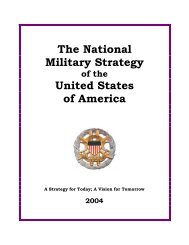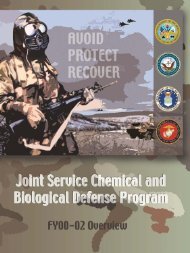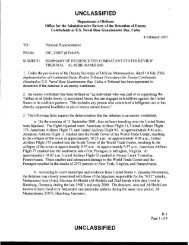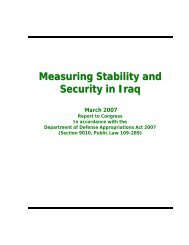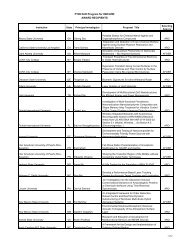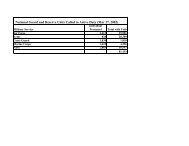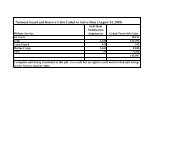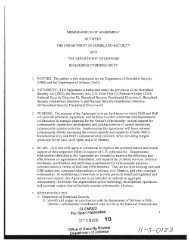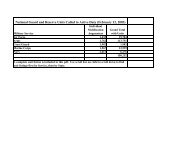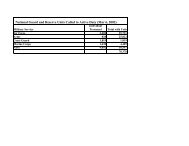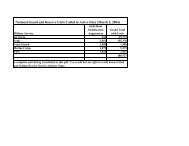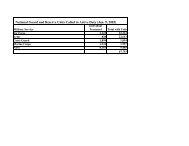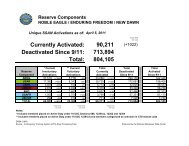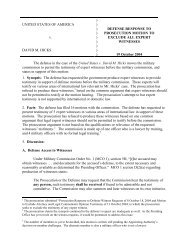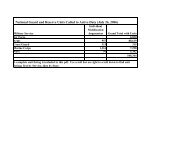Report - United States Department of Defense
Report - United States Department of Defense
Report - United States Department of Defense
You also want an ePaper? Increase the reach of your titles
YUMPU automatically turns print PDFs into web optimized ePapers that Google loves.
UNCLASSIFIED<br />
SECTION 3 – GOVERNANCE<br />
GIRoA’s ability to provide stable, effective, and responsive governance is slowly improving, but<br />
faces considerable challenges, including corruption at various levels, ineffective program<br />
monitoring, sub-national budget shortfalls, an inability to generate revenue sufficient to cover the<br />
cost <strong>of</strong> government operations, and limited public financial management capacity. Weak<br />
cooperation between the national and sub-national levels <strong>of</strong> governance hampers significant<br />
long-term sustainability and undermines public confidence. Limited human capacity, together<br />
with a lack <strong>of</strong> appropriate formal training and education within the civil service and Afghan<br />
populace, continue to impede the development <strong>of</strong> stable and sustainable government across the<br />
country.<br />
The concentration <strong>of</strong> power in Kabul and the lack <strong>of</strong> coordination between the different<br />
governmental bodies and the sub-national elements continue to limit effectiveness and<br />
legitimacy. National institutions are developing but still lack the necessary checks and balances.<br />
At the sub-national level, <strong>of</strong>ficial government services are largely restricted to provincial and<br />
district centers, despite efforts to improve capacity and project governance services to rural<br />
areas. GIRoA’s inability to provide services currently managed by the international community<br />
threatens the management, oversight, delivery, and operation and maintenance <strong>of</strong> these services<br />
during and after transition.<br />
During this reporting period, GIRoA continued to work towards meeting the commitments set at<br />
the Tokyo Conference in July 2012, including drafting the concept paper for implementing the<br />
Tokyo Mutual Accountability Framework (TMAF), finalizing the Aid Management Policy<br />
(AMP), and continuing to move the remaining six National Priority Programs (NPPs) through<br />
the approval process. 28 The NPPs outline Afghan strategic security, governance, and<br />
development reforms, as well as service delivery priorities. Four <strong>of</strong> the six remaining NPPs were<br />
endorsed by the UN-Afghan Joint Coordination and Monitoring Board (JCMB) on February 12,<br />
2013; one from the Governance Cluster and three from the Socio-Economic Development<br />
Cluster. The AMP, which aims to improve the delivery and impact <strong>of</strong> the international delivery<br />
assistance, was also endorsed at the February 2013 JCMB. The remaining two NPPs within the<br />
Governance Cluster, “Transparency and Accountability” and “Law and Justice for All,” are<br />
anticipated to be ready for endorsement at the JCMB tentatively scheduled for June 2013.<br />
However, Afghan compliance with many <strong>of</strong> the provisions <strong>of</strong> the TMAF is yet to be determined.<br />
Fighting corruption, reforming civil governance and enforcing law is imperative for the Afghan<br />
government. During the reporting period, the three branches <strong>of</strong> the government worked on<br />
Presidential Decree 45 (PD 45), issued in July 2012. This 164-point decree includes 38 anticorruption<br />
related articles. In the eight months since PD45 was released, GIRoA has issued<br />
general press releases with percentages <strong>of</strong> completion <strong>of</strong> tasks, but has not issued any detailed<br />
information. Most tasks only require tabling <strong>of</strong> a report to Cabinet for completion, not achieving<br />
a specific result. Direct inquiries with the ministries/entities indicate that most seem to be<br />
28 The four newly endorsed NPPs, as <strong>of</strong> February 2013, were “Efficient and Effective Governance,” “Water and Natural Resources,”<br />
“Comprehensive Agriculture Production,” and “National Energy Supply.” 20 <strong>of</strong> 22 NPPs have now been endorsed.<br />
125



